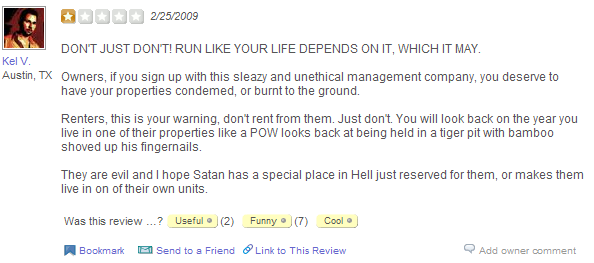This is a follow up to our survey of almost 3,000 reviews of property management companies on Yelp and Yahoo Local.
Why is it that management companies seem to get such a bad rap in online reviews? It would be easy to dismiss these review sites as being platforms for libel by disgruntled people with an axe to grind, but the reality is rating sites are a useful tool that are widely used by consumers.
61% of people rely on user reviews for product information or research before a buying decision is made. (Razorfish, 2008)
Knowing that consumers use online rating and review sites for everything from restaurants to doctors to apartments, we felt compelled to better understand why our research showed property managers were on average getting 30% lower ratings than the average for all other industries.
In fact if you’re looking to be entertained by passionately negative reviews, the property management industry pretty much takes the cake:

Unfortunately property management can be a thankless job, where tenants are hyper-sensitive to mistakes and often resent the enforcer aspect of the management company’ role. Obviously, not all tenant/property manager relations are like this, but as our research and the ubiquity of these glowing (as in firebrand) reviews show, it isn’t uncommon either.
Here’s my breakdown of what makes this industry unique in garnering so much negativity.
Spoiler alert: You’re going to be disappointed if you’re wanting me to place all the blame squarely on tenants or the management company.
The single biggest reason for low reviews from tenants is that the management company acts as an enforcer to uphold the interests of the landlord. This tension lies behind about 75% of the negative reviews we surveyed. Granted, the complaints tend to deal with surface issues, but this enforcement dynamic in the relationship is a root cause for bad blood between tenants and management companies. In this respect, property management has something in common with professions like police officer, tax collector, prison guard, prosecutor, repo man, etc., which all have significant enforcement roles and suffer from the same negative sentiment.
This negative perception of the MC as an enforcer is amplified when it is the only frame of reference tenants have. Because much of rental housing is treated like a commodity (renters shop primarily on price) margins are low, leaving little room for the kinds of extra services that create a positive impression and relationship. This means that tenant interaction is limited to paying bills, trying to get broken things fixed, or reporting other problems, which isn’t exactly the foundation for a glowing relationship.
Together, these factors have a negative impact on both tenant AND management behavior making it easier to find fault than solutions. Constructive dialogue is quickly replaced with a willingness to jump to conclusions and demonize the actions of the other party. Once an “us against them” mentality takes hold, it isn’t long before the tenant views himself as the little guy “fighting the man” in a crusade against landlord tyranny. The flip-side is the property manager who feels totally unappreciated and is tired of getting dumped on resulting in cold or overly heavy handed in dealings with tenants.
All these emotions are amplified by the fact that people’s homes are an important part of their security causing strong reactions to any perceived threat.
Again, my goal is not to label one side as being primarily responsible. We can all recognize that there are bad tenants that don’t pay rent, as well as negligent management companies that fail in their responsibilities. My point is that the inherent dynamics of the tenant/manager relationship lend themselves to strife.
Obviously I’m not the first person to recognize this and many management companies have well thought out tenant retention programs designed to maintain strong positive relationships and keep tenants happy. Check out Mike Brewer and Heather Blume for cutting edge strategies.
Is it fair?
No, but does that really matter?
Clearly, tenants are not in a position to tell owners who they should hire, and yet their reviews can affect the reputation of the management companies and influence client perceptions. While this can be a bitter pill to swallow, it’s imperative that you embrace the fact that you’re not in control of what is said about you online.
As consumers are empowered by review sites and social networks to share their experiences, businesses of all types are becoming acutely aware of the need for online reputation management.
Who is talking about you, what are they saying, and how should you respond? We’ll cover this and more in next week’s overview of reputation management for property management companies.
How are you dealing with tenants and owners talking about you online?
Tagged as:
online reviews,
property management ratings,
tenant


